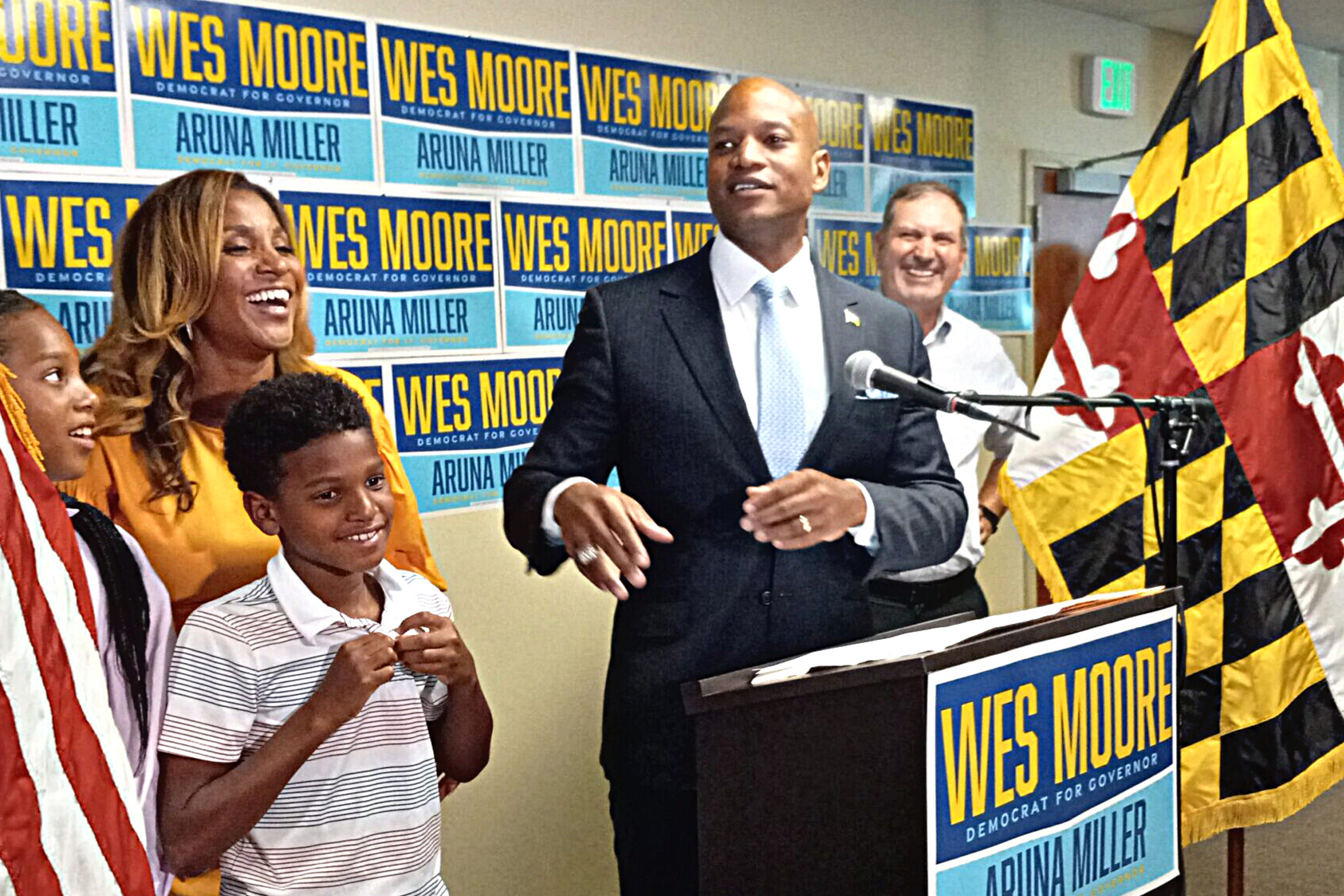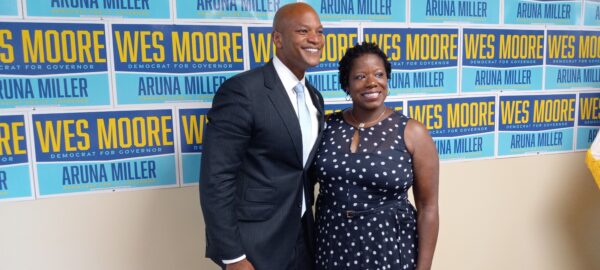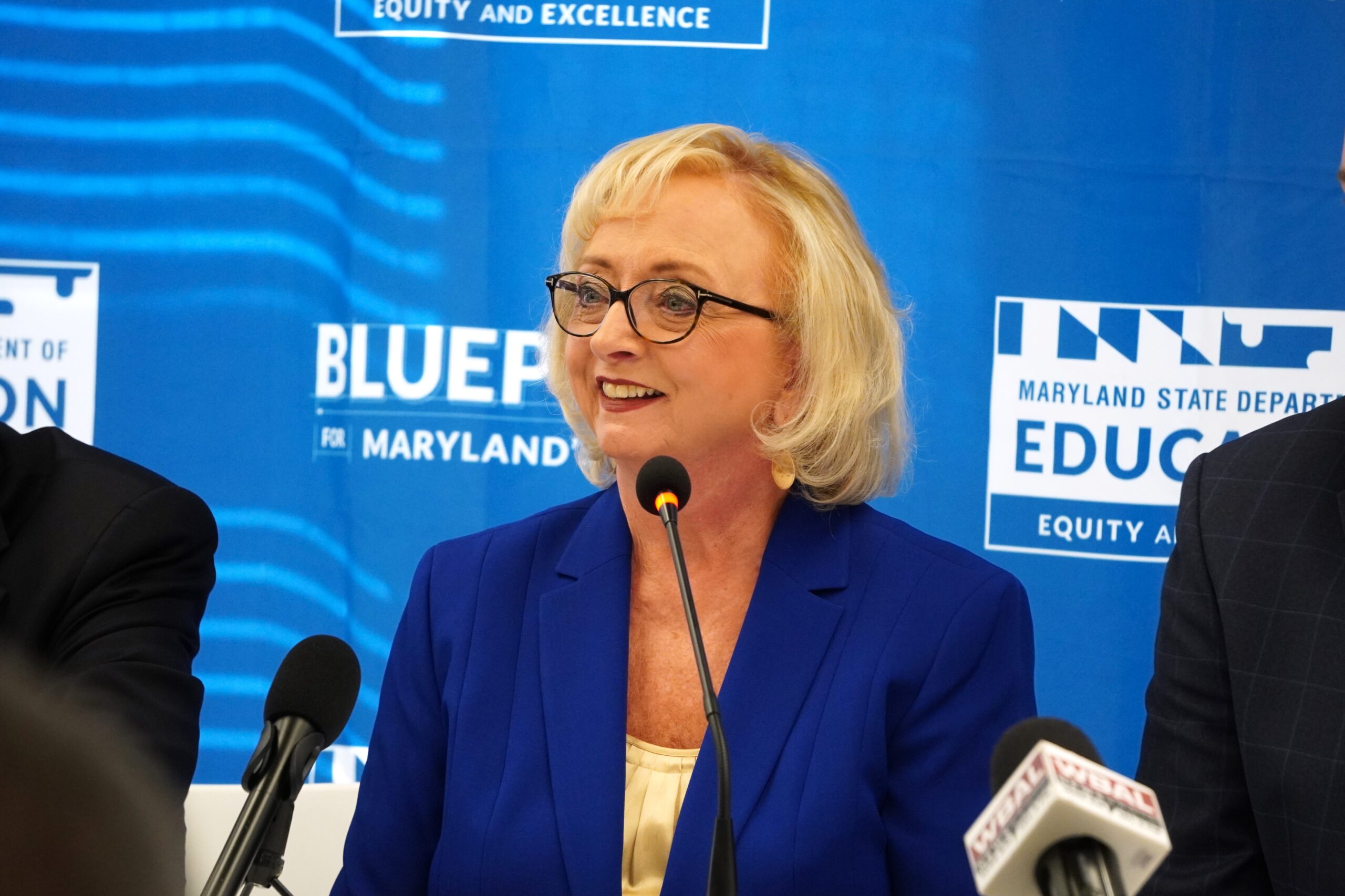Declaring Victory, Moore Wastes No Time Drawing Contrasts With Cox

Wes Moore, whose by-the-bootstraps life story has led to stints as an entrepreneur, nonprofit CEO, and best-selling author, claimed victory Saturday in the Democratic primary for governor, taking him one step closer to the pinnacle of Maryland politics in his first run for elected office.
The Associated Press called the primary for Moore at 11 p.m. Friday, but Moore waited until late Saturday afternoon to acknowledge the victory, waiting for his nearest competitor, former U.S. Labor Secretary Tom Perez, to concede.
“Thank you not just for your votes, but for the votes of confidence,” Moore told a roomful of cheering supporters Saturday at his campaign’s field office on Madison Avenue in West Baltimore.
As of Saturday afternoon, the Maryland State Board of Elections showed Moore with 33.77%, Perez with 28.34%, state Comptroller Peter Franchot with 21.47%, and seven other Democratic candidates splitting the rest. Franchot conceded on Friday.
In his concession statement Saturday, which came at about 3:30 p.m., Perez, who also served as Maryland Labor secretary and as chair of the Democratic National Committee, pledged his full support to Moore and his running mate, former Del. Aruna Miller (D-Montgomery).
“I congratulate Wes Moore and Aruna Miller on their hard-fought victory,” Perez said. “Now is the time for us to unite, and I look forward to aggressively working with them to flip Maryland blue this November.”
Moore now heads to a general election with the Republican nominee, Del. Dan Cox, an arch-conservative who has parroted former President Trump’s line that the 2020 White House election was stolen. Some Republican leaders — chief among them Gov. Lawrence J. Hogan Jr., who supported Cox’s chief GOP primary opponent, former state Commerce Secretary Kelly Schulz — have tried to distance themselves from Cox. Hogan, who has branded Cox “a QAnon whack job,” earlier this week predicted that Cox could not win the general election.
Moore wasted no time trying to draw contrasts between himself and Cox.
“The choice could not be more clear,” he said, accusing Cox of fomenting divisiveness and promoting “cynical policies of conspiracy theories and fear.”
The fall campaign pits a political novice against a first-term state lawmaker with few legislative accomplishments in a race that Democrats are favored to win. But Democrats, eager to take back Government House after eight years of Hogan, will have to cope with overconfidence and national political headwinds that could boost Republicans.
Moore pledged that Democrats would not take the general election for granted.
“There’s some sense that [Cox] hasn’t been taken seriously in the past,” he said. “I will take my opponent very seriously.”

Two dozen elected officials turned up in West Baltimore on Saturday to watch Wes Moore declare victory in the Democratic primary for governor. Here he poses with Prince George’s County State’s Attorney Aisha Braveboy. Photo by Josh Kurtz.
Although this is first campaign for office, Moore lined up a seasoned campaign team and attracted a steady stream of support from an array of elected officials, including U.S. House Majority Leader Steny Hoyer, both presiding officers of the General Assembly, former Gov. Parris Glendening, Prince George’s County Executive Angela Alsobrooks, Anne Arundel County Executive Steuart Pittman, and Reps. Dutch Ruppersberger and Kweisi Mfume. He also raised more money than other candidates by a substantial margin.
Two dozen elected officials attended the Moore victory celebration, including Baltimore Mayor Brandon Scott (D), who remained neutral during the gubernatorial primary, and Del. Brooke Lierman (D-Baltimore City), the newly-minted Democratic nominee for state comptroller. Ruppersberger, Alsobrooks and Miller spoke before Moore did.
Moore, 43, was born in Takoma Park and lived in the Washington, D.C., area, but his family’s fortunes took a turn for the worse when his father died of an undiagnosed disease when Moore was 3. His family later moved to the Bronx, and after struggling, Moore eventually went to military school and served in the Army. He got his bachelors degree from Johns Hopkins University, became a Rhodes Scholar, started an education business in Baltimore, and eventually became CEO of the Robin Hood Foundation, a New York-based anti-poverty organization.
On Saturday, Moore reiterated his central campaign theme that he plans to lift up Marylanders of all economic stations. He noted his family’s economic struggles while he was growing up, and said, “I’ve seen the consequences of a society that leaves too many people behind. I don’t need a white paper to explain it. I’ve lived it.”
Moore had been urged to run for office before — both for mayor of Baltimore and for Congress following the death of the late U.S. Rep. Elijah Cummings (D) — but turned down those entreaties. When he announced his candidacy for governor in June of 2021, he said he was moved to become a candidate this time because of the unequal devastation in Maryland wrought by COVID-19.
Moore argued throughout the campaign that even though he was seeking the Democratic nomination against several veteran officeholders, he had the most well-rounded experience and was best-equipped to confront the state’s challenges.
On Saturday, he paid tribute to his vanquished Democratic primary opponents and asserted that he would need their help to defeat the Republicans.
“We have good relationships with the other folks who have run for governor and we know we’re going to move in partnership with them,” Moore said. “We need them now. We’re going to need them in November. And we’re going to need them beyond.”
Moore would become the first Black governor of Maryland if he is elected, and his running mate, Miller, would become the first lieutenant governor of Asian descent and the second woman to serve in that position.
“We didn’t get in this race to make history,” Moore said. “We got in this race to make child poverty history. We got in this race to make educational inequality history.”





 Creative Commons Attribution
Creative Commons Attribution